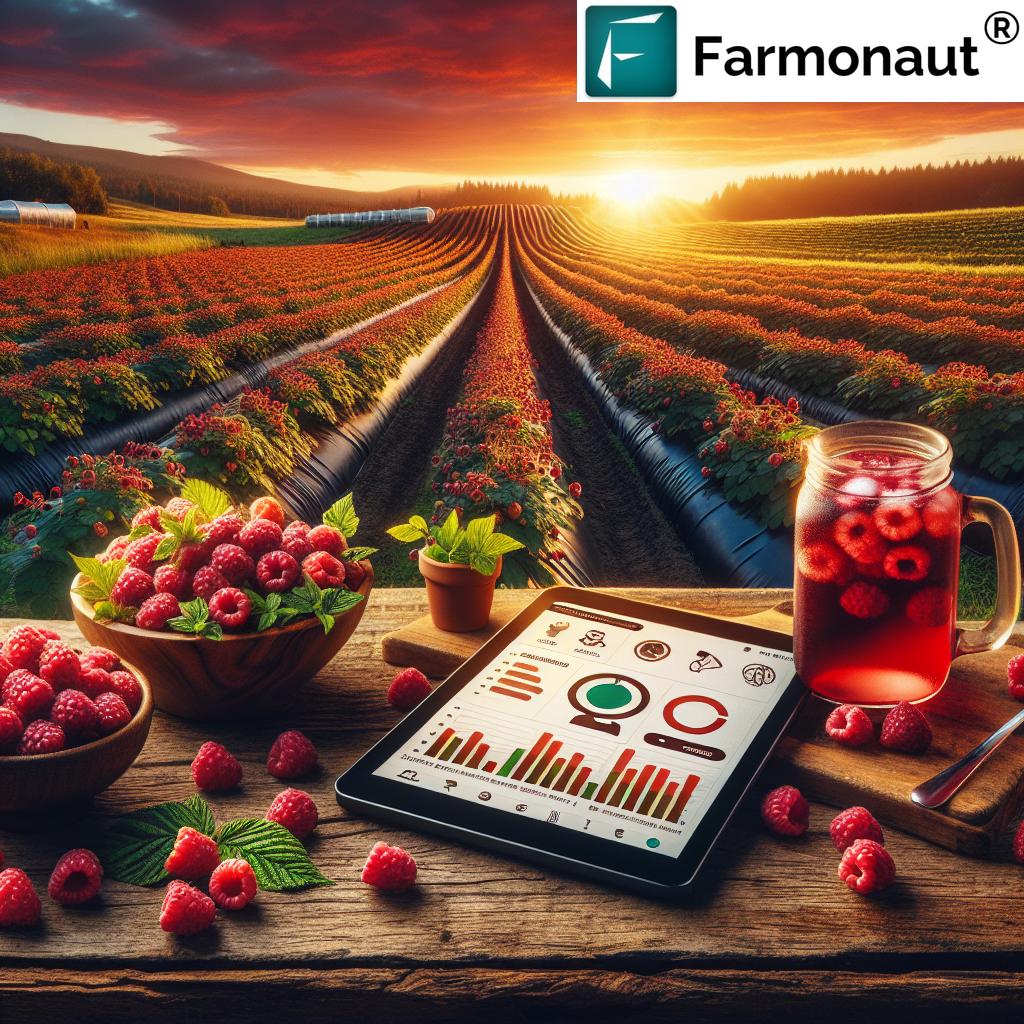Unlock the Sweet Secrets: 10 Delicious Raspberry Recipes and Expert Growing Tips for Canadian Farmers
“Canadian raspberry farmers can control cane spread using grass, potentially reducing maintenance costs by up to 30%.”

Welcome to our delightful exploration of the sweet and versatile world of raspberries! Whether you’re a seasoned Canadian farmer or a home gardener with a passion for berries, this comprehensive guide is packed with expert tips on raspberry farming and mouthwatering recipes that will inspire you to make the most of your harvest. So, let’s dive into the juicy details of growing and enjoying these delicious fruits!
The Berry Best: Understanding Raspberries
Raspberries are a treasure trove of flavor and nutrition. These vibrant red berries are not only delicious but also packed with health benefits. Rich in antioxidants, vitamins, and fiber, raspberries are a versatile crop that can be enjoyed fresh, frozen, or transformed into various culinary delights.
Before we delve into the growing tips and recipes, let’s take a moment to appreciate the variety of raspberries available to Canadian farmers:
| Raspberry Variety | Flavor Profile | Best Uses | Growing Difficulty |
|---|---|---|---|
| Heritage | Sweet and mild | Fresh eating, jams | Easy |
| Latham | Tart and aromatic | Baking, preserves | Moderate |
| Autumn Bliss | Rich and sweet | Fresh eating, smoothies | Easy |
| Boyne | Sweet with a hint of tartness | Freezing, sauces | Moderate |
| Nova | Mild and sweet | Fresh eating, salads | Easy |
Now that we’ve whetted your appetite for these delightful berries, let’s explore how to grow them successfully in the Canadian climate.
Raspberry Farming Tips for Canadian Growers
Growing raspberries in Canada requires some specific knowledge and techniques to ensure a bountiful harvest. Here are our top tips for successful raspberry cultivation:
- Choose the right location: Raspberries thrive in full sun with well-drained soil. Ensure your planting site receives at least 6-8 hours of direct sunlight daily.
- Prepare the soil: Raspberries prefer slightly acidic soil with a pH between 5.5 and 6.5. Incorporate organic matter into the soil before planting to improve fertility and drainage.
- Select hardy varieties: Choose raspberry varieties that are well-suited to your specific Canadian climate zone. Cold-hardy varieties like ‘Boyne’ and ‘Nova’ are excellent choices for many Canadian regions.
- Plant at the right time: In most parts of Canada, early spring is the best time to plant raspberries, once the soil has thawed and can be worked.
- Provide proper support: Install a trellis system or support wires to keep raspberry canes upright and make harvesting easier.
- Manage water and fertilizer: Raspberries need consistent moisture, especially during fruit development. Use mulch to retain soil moisture and suppress weeds. Fertilize with a balanced, organic fertilizer in early spring.
- Prune regularly: Proper pruning is essential for maintaining healthy plants and maximizing yields. Remove old canes after fruiting and thin out weak or crowded canes in early spring.
- Control cane spread: Use grass as a natural barrier to control the spread of raspberry canes. This technique can help reduce maintenance costs and keep your raspberry patch manageable.
By following these tips, you’ll be well on your way to growing a thriving raspberry patch that will reward you with delicious berries year after year.
Sustainable Berry Farming Practices
As responsible farmers and gardeners, it’s crucial to implement sustainable practices in our raspberry cultivation. Here are some eco-friendly approaches to consider:
- Companion planting: Grow complementary plants like garlic or marigolds near your raspberries to naturally deter pests and attract beneficial insects.
- Organic pest control: Use natural methods like neem oil or insecticidal soaps to manage pests without harmful chemicals.
- Water conservation: Implement drip irrigation or soaker hoses to efficiently water your raspberry plants and reduce water waste.
- Crop rotation: Rotate your raspberry patch every 4-5 years to prevent soil depletion and reduce disease pressure.
- Composting: Create your own compost using kitchen scraps and garden waste to nourish your raspberry plants naturally.
By adopting these sustainable practices, you’ll not only produce healthier raspberries but also contribute to the overall health of your farm ecosystem.
Optimizing Your Raspberry Harvest
To ensure you get the most from your raspberry crop, consider these harvest optimization techniques:
- Harvest at the right time: Pick raspberries when they are fully colored and easily detach from the plant. Morning is the best time to harvest when the berries are cool and firm.
- Handle with care: Gently place harvested berries in shallow containers to prevent crushing.
- Cool quickly: Refrigerate harvested berries promptly to maintain freshness and extend shelf life.
- Succession planting: Plant both summer-bearing and fall-bearing varieties to extend your harvest season.
- Monitor plant health: Regularly inspect your plants for signs of disease or pest infestation to address issues promptly.
By implementing these strategies, you’ll maximize your raspberry yield and ensure a steady supply of fresh berries throughout the growing season.
Preserving the Harvest: Raspberry Preservation Techniques
To enjoy your raspberries long after the harvest season, try these preservation methods:
- Freezing: Spread clean, dry berries on a baking sheet and freeze until solid. Transfer to freezer bags for long-term storage.
- Canning: Make delicious raspberry jam or preserves using a water bath canning method.
- Dehydrating: Use a food dehydrator to create tasty dried raspberry snacks.
- Infusing: Create flavored vinegars or oils by infusing them with fresh raspberries.
These preservation techniques allow you to savor the taste of summer all year round and reduce food waste from your bountiful harvest.
Health Benefits of Raspberries
“A single serving of raspberries contains more than 50% of the recommended daily intake of vitamin C.”
Raspberries aren’t just delicious; they’re also packed with nutrients that offer numerous health benefits:
- High in antioxidants: Raspberries are rich in antioxidants that help protect your cells from damage caused by free radicals.
- Fiber-rich: These berries are an excellent source of dietary fiber, promoting digestive health and helping you feel full longer.
- Vitamin C powerhouse: As mentioned in our trivia, raspberries are an excellent source of vitamin C, supporting immune function and skin health.
- Heart-healthy: The anthocyanins in raspberries may help reduce the risk of heart disease.
- Anti-inflammatory properties: Regular consumption of raspberries may help reduce inflammation in the body.
Incorporating raspberries into your diet is a delicious way to boost your overall health and well-being.
10 Delicious Raspberry Recipes
Now that we’ve covered the growing and health aspects of raspberries, let’s dive into some mouthwatering recipes that showcase the versatility of these delightful berries. Here are ten delicious ways to enjoy your raspberry harvest:
1. Classic Raspberry Jam
Start with a timeless favorite – homemade raspberry jam. This sweet and tangy spread is perfect on toast, scones, or as a filling for pastries.
Ingredients:
- 4 cups fresh raspberries
- 4 cups sugar
- 1 tablespoon lemon juice
Instructions:
- In a large pot, combine raspberries, sugar, and lemon juice.
- Bring the mixture to a boil over medium-high heat, stirring frequently.
- Reduce heat and simmer for about 20 minutes, or until the jam reaches the desired consistency.
- Pour into sterilized jars and process in a water bath canner if desired.
2. Raspberry Vinaigrette
This vibrant dressing adds a burst of flavor to any salad and is incredibly easy to make.
Ingredients:
- 1/2 cup fresh raspberries
- 1/4 cup olive oil
- 2 tablespoons balsamic vinegar
- 1 tablespoon honey
- Salt and pepper to taste
Instructions:
- Blend all ingredients in a food processor or blender until smooth.
- Strain through a fine-mesh sieve to remove seeds if desired.
- Store in an airtight container in the refrigerator for up to a week.
3. Raspberry Smoothie Bowl
Start your day with this nutritious and Instagram-worthy smoothie bowl.
Ingredients:
- 1 cup frozen raspberries
- 1 frozen banana
- 1/2 cup Greek yogurt
- 1/4 cup almond milk
- Toppings: fresh raspberries, sliced almonds, chia seeds
Instructions:
- Blend frozen raspberries, banana, yogurt, and almond milk until smooth.
- Pour into a bowl and top with fresh raspberries, almonds, and chia seeds.
4. Raspberry Lemonade
Quench your thirst with this refreshing summer drink that’s perfect for picnics and barbecues.
Ingredients:
- 2 cups fresh raspberries
- 1 cup freshly squeezed lemon juice
- 1 cup sugar
- 4 cups water
- Ice cubes
Instructions:
- Puree raspberries in a blender and strain to remove seeds.
- In a pitcher, combine raspberry puree, lemon juice, sugar, and water. Stir until sugar dissolves.
- Chill in the refrigerator for at least an hour before serving over ice.
5. Raspberry and Poppy Seed Salad
This light and refreshing salad is perfect for summer lunches or as a side dish for grilled meats.
Ingredients:
- 4 cups mixed salad greens
- 1 cup fresh raspberries
- 1/4 cup crumbled feta cheese
- 2 tablespoons poppy seeds
- 1/4 cup sliced almonds
- Raspberry vinaigrette (from recipe above)
Instructions:
- In a large bowl, combine salad greens, raspberries, feta cheese, poppy seeds, and almonds.
- Drizzle with raspberry vinaigrette just before serving and toss gently to combine.
6. Raspberry Cheesecake Bars
Indulge in these creamy, fruity dessert bars that are sure to be a crowd-pleaser.
Ingredients:
- 2 cups graham cracker crumbs
- 1/2 cup melted butter
- 2 (8 oz) packages cream cheese, softened
- 1 cup sugar
- 2 eggs
- 1 teaspoon vanilla extract
- 2 cups fresh raspberries
Instructions:
- Mix graham cracker crumbs with melted butter and press into a 9×13 inch baking pan.
- Beat cream cheese, sugar, eggs, and vanilla until smooth. Pour over crust.
- Sprinkle raspberries over the top and bake at 350°F for 35-40 minutes.
- Cool completely before cutting into bars.
7. Raspberry Sorbet
Cool off with this refreshing and simple frozen treat that showcases the pure flavor of raspberries.
Ingredients:
- 4 cups fresh raspberries
- 1 cup sugar
- 1 tablespoon lemon juice
- 1/4 cup water
Instructions:
- Puree raspberries in a blender and strain to remove seeds.
- In a saucepan, combine sugar and water. Heat until sugar dissolves.
- Mix raspberry puree, sugar syrup, and lemon juice. Chill thoroughly.
- Freeze in an ice cream maker according to manufacturer’s instructions.
8. Raspberry Baked Brie
Elevate your appetizer game with this elegant and easy raspberry-topped baked brie.
Ingredients:
- 1 wheel of brie cheese (8-10 oz)
- 1/2 cup fresh raspberries
- 2 tablespoons honey
- 1/4 cup chopped pecans
- Crackers or baguette slices for serving
Instructions:
- Preheat oven to 350°F. Place brie in a small baking dish.
- Top with raspberries, drizzle with honey, and sprinkle with pecans.
- Bake for 10-15 minutes, until cheese is soft and gooey.
- Serve warm with crackers or baguette slices.
9. Raspberry Chia Seed Pudding
Prepare this nutritious and delicious breakfast the night before for an easy morning meal.
Ingredients:
- 1 cup almond milk
- 1/4 cup chia seeds
- 1 cup fresh raspberries
- 2 tablespoons maple syrup
- 1/2 teaspoon vanilla extract
Instructions:
- In a blender, combine almond milk, raspberries, maple syrup, and vanilla. Blend until smooth.
- Pour into a jar and stir in chia seeds.
- Refrigerate overnight, stirring occasionally if possible.
- Serve topped with fresh raspberries and a drizzle of maple syrup.
10. Raspberry Glazed Pork Tenderloin
This savory-sweet main dish showcases how well raspberries pair with meat.
Ingredients:
- 1 pork tenderloin (about 1 lb)
- Salt and pepper to taste
- 1 cup fresh raspberries
- 2 tablespoons balsamic vinegar
- 2 tablespoons honey
- 1 tablespoon Dijon mustard
Instructions:
- Preheat oven to 375°F. Season pork with salt and pepper.
- In a small saucepan, combine raspberries, vinegar, honey, and mustard. Simmer until raspberries break down and sauce thickens.
- Sear pork in an oven-safe skillet, then brush with raspberry glaze.
- Roast in the oven for 20-25 minutes, basting occasionally with glaze.
- Let rest for 5 minutes before slicing and serving with remaining glaze.
These ten recipes showcase the versatility of raspberries in both sweet and savory dishes. From refreshing drinks to decadent desserts and even main courses, there’s a raspberry recipe for every occasion and taste preference.
Leveraging Technology in Raspberry Farming
In today’s modern agricultural landscape, technology plays a crucial role in optimizing crop management and increasing yields. For raspberry farmers looking to take their operations to the next level, Farmonaut offers innovative solutions that can revolutionize your farming practices.
Farmonaut’s satellite-based farm management solutions provide valuable insights into crop health, soil moisture levels, and other critical metrics. By leveraging this technology, raspberry farmers can make data-driven decisions to improve their crop yields and reduce resource wastage.

Here are some ways Farmonaut can benefit raspberry farmers:
- Real-time crop monitoring: Keep a close eye on your raspberry fields from anywhere, at any time.
- Early detection of issues: Identify potential problems like pest infestations or nutrient deficiencies before they become severe.
- Optimized resource management: Make informed decisions about irrigation and fertilizer application based on accurate data.
- Yield prediction: Use AI-powered insights to estimate your raspberry harvest and plan accordingly.
- Weather forecasting: Access location-specific weather data to protect your crops from adverse conditions.
To learn more about how Farmonaut can enhance your raspberry farming operations, check out their web app, Android app, or iOS app.
For developers interested in integrating Farmonaut’s satellite and weather data into their own systems, explore the API and API Developer Docs.
Organic Raspberry Cultivation
For farmers interested in organic raspberry production, here are some key principles to follow:
- Soil health: Focus on building healthy soil through composting and cover cropping.
- Natural pest control: Use biological controls and encourage beneficial insects to manage pests.
- Weed management: Implement mulching and manual weeding techniques to control weeds without chemicals.
- Crop rotation: Rotate raspberries with other crops to break pest and disease cycles.
- Organic fertilizers: Use compost, aged manure, and organic fertilizers to nourish your plants.
By following these organic practices, you can produce high-quality raspberries while maintaining a healthy farm ecosystem.
Frequently Asked Questions
Here are answers to some common questions about raspberry farming and usage:
- Q: How long does it take for raspberry plants to produce fruit?
A: Most raspberry varieties will produce some fruit in their first year, but it typically takes 2-3 years for plants to reach full production. - Q: Can raspberries be grown in containers?
A: Yes, dwarf varieties of raspberries can be successfully grown in large containers with proper care and attention to watering and fertilization. - Q: How often should raspberry plants be watered?
A: Raspberry plants need consistent moisture, especially during fruit development. Water deeply once or twice a week, or more frequently during dry spells. - Q: What’s the best way to store fresh raspberries?
A: Store unwashed raspberries in a single layer in a paper towel-lined container in the refrigerator. Use within 2-3 days for best quality. - Q: Can raspberries be frozen?
A: Yes, raspberries freeze well. Spread them in a single layer on a baking sheet, freeze until solid, then transfer to freezer bags for long-term storage.
Conclusion
From the fertile fields of Canada to your kitchen table, raspberries offer a world of delicious possibilities and farming opportunities. By implementing the growing tips, sustainable practices, and technology solutions we’ve discussed, you can cultivate a thriving raspberry crop that will delight both your taste buds and your bottom line.
Remember, successful raspberry farming is a blend of traditional wisdom and modern innovation. Whether you’re managing a large-scale operation or tending to a backyard patch, the key is to stay informed, adapt to changing conditions, and always strive for quality.
We hope this guide has inspired you to explore the sweet world of raspberries further. From planting your first canes to experimenting with new recipes, every step of the raspberry journey is an adventure in flavor and sustainability. Happy growing, and bon appétit!
For more information on how Farmonaut can help optimize your raspberry farming operations, explore our subscription options below:
Start your journey to smarter, more efficient raspberry farming today with Farmonaut’s cutting-edge agricultural technology solutions.




